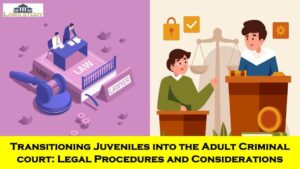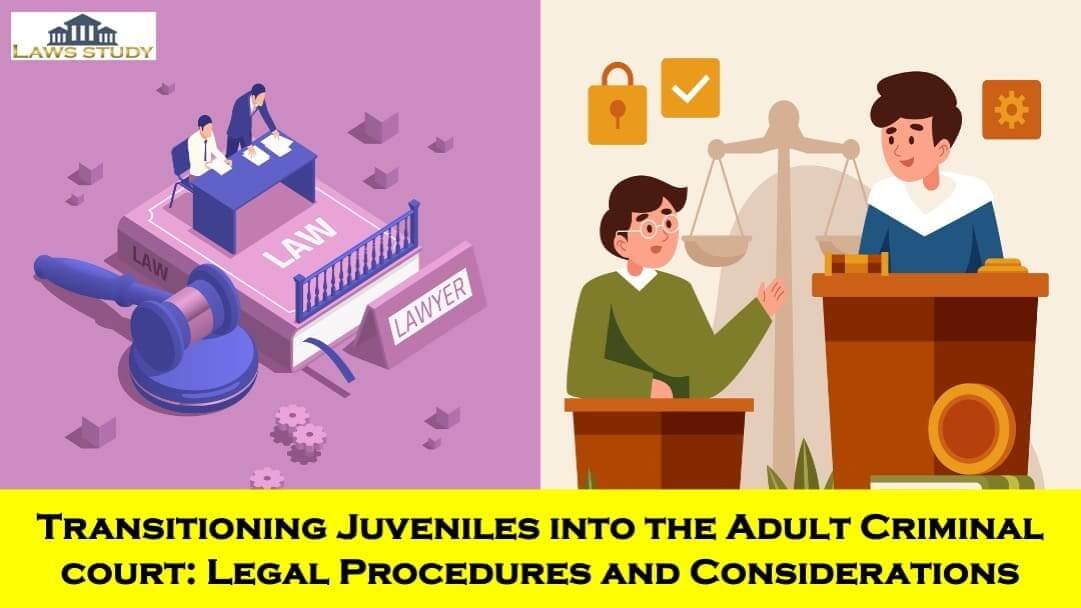Transitioning Juveniles into the Adult Criminal Court : Legal Procedures and Considerations
In certain circumstances, a juvenile court judge may make the determination that a juvenile has voluntarily relinquished the protective measures associated with juvenile court and, consequently, may opt to transfer their case into the adult criminal justice system.
This decision may also be triggered when a juvenile is a repeat offender, as the sanctions within the juvenile justice system may be deemed insufficient to rectify their behavior. It is worth noting that most juveniles strive to evade having their cases heard in adult court. A conviction in adult court can lead to more severe consequences, including the possibility of mandatory minimum sentences and other punitive measures.
Furthermore, a judge in adult court may have less discretion in tailoring a sentence compared to their counterpart in the juvenile justice system. Such a conviction can also have a profound and enduring impact on a juvenile’s social and professional prospects, as these convictions are less likely to be expunged and are generally viewed with greater seriousness by those who interact with the juvenile.
Juveniles subjected to adult court proceedings can face considerably harsher penalties, including the potential for life imprisonment, compared to what is typically available within the juvenile justice system.

However, there are certain advantages to being tried in adult court as opposed to juvenile court. Notably, a juvenile can exercise their right to a jury trial, an option usually unavailable in juvenile court. This may result in a more lenient sentence since juries often exhibit greater empathy toward underage defendants compared to judges. Additionally, many judges and prosecutors in adult court endeavor to expedite cases involving underage defendants to concentrate their efforts on cases involving adults. This inclination toward efficiency can sometimes lead to more favorable plea bargain negotiations.
Prerequisites for Transfer to Adult Court
There is typically a minimum age at which a juvenile can be considered for trial in adult court, which is generally around 16 years old, although certain jurisdictions may set it as low as 13 or designate a different threshold.
In some states, any juvenile, regardless of age, can be tried in adult court when facing charges related to severe crimes such as homicide or similar offenses. Concerns about escalating juvenile crime rates have prompted movements in several states to lower the minimum age for transfers to adult court and broaden the spectrum of crimes that warrant such transfers.
Common scenarios in which a judge may decide to order a transfer include cases involving exceptionally grave offenses, instances where the juvenile has a history of multiple prior offenses, or situations where the juvenile is nearing the age of legal majority.
The judge’s determination may also take into account the effectiveness of previous attempts at rehabilitating the juvenile within the juvenile justice system. If prior interventions have proved ineffective, the judge may conclude that revisiting these options would be unproductive.
Waiver Petitions and Automatic Transfers
The process of transferring a case to adult court may be initiated by either the prosecutor or the judge. Irrespective of the initiator, the juvenile retains the right to challenge the transfer through a hearing, often referred to as a waiver hearing or fitness hearing. During this hearing, the prosecutor is obligated to demonstrate probable cause to believe that the juvenile committed the alleged crime.
If the prosecutor successfully meets this burden, the judge proceeds to evaluate whether the juvenile can be effectively rehabilitated within the juvenile justice system. This evaluation takes into account various factors, including the juvenile’s criminal record (if any), family background, and their response to prior interventions by law enforcement.
Automatic Transfer Laws
Certain states have enacted automatic transfer laws, which mandate the automatic transfer of a juvenile to adult court when they meet specific age and offense criteria. For instance, a state may stipulate that any juvenile aged at least 16 must be transferred to adult court when facing charges related to homicide or sexual offenses.
Even in cases governed by automatic transfer laws, the juvenile retains the ability to challenge the transfer through a reverse waiver hearing. In this scenario, the burden of proof shifts to the juvenile, who must demonstrate why they should remain within the juvenile system, rather than the prosecutor.
Transition to Adult Court
Upon the transfer of a case from juvenile court to adult court, the legal process is essentially reset within the adult court system. This process begins with the arraignment, during which the juvenile is formally charged. Subsequently, the case proceeds much like it would for an adult defendant.
Conclusion
The decision to transfer a juvenile’s case to adult court is a multifaceted process that takes into consideration various legal factors, including the gravity of the offense, the juvenile’s previous history, and the potential for rehabilitation. While adult court offers certain advantages, including jury trials and expeditious case resolution, it also carries the risk of more severe penalties and lasting consequences for the juvenile’s future.
The determination of whether a juvenile should be tried as an adult necessitates a thorough assessment of these factors to ensure fairness and justice in the outcome.

























